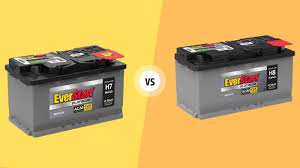Automotive batteries are critical to the proper operation of a car, powering everything from the lights to the engine itself. Choosing the correct battery is critical for maximum performance and lifespan. In this post, we will go over the comparison of two popular battery types, H7 vs H8, and provide a thorough comparison to help you make an informed decision for your vehicle.
Recognizing the H7 Battery
-
Specifications and Description
The H7 battery is a common automobile battery that is noted for its dependability and versatility. It is available in a variety of sizes, although the H7 designation refers to a specific form factor. Dimensions, cold cranking amps (CCA), reserve capacity (RC), and voltage are all important specifications.
Dimensions and size: The H7 battery is normally 12.4 x 7.6 x 7.5 inches in size, making it compatible with a wide range of cars.
CCA (Cold Cranking Amps): H7 batteries, with CCA values ranging from 600 to 800 amps, are ideal for starting automobiles in chilly locations.
Reserve Capacity (RC): H7 batteries have a considerable reserve capacity, allowing for continuous power delivery even while the alternator is not charging.
Voltage: H7 batteries, like most automobile batteries, operate at 12 volts.
-
Common Applications and Vehicle Compatibility
H7 batteries are commonly found in a wide range of vehicle types, including sedans, SUVs, and certain trucks. Many popular automobile manufacturers recommend or include H7 batteries.
-
Benefits of H7 Batteries
Versatility:
H7 batteries are adaptable and can be used in a wide range of vehicles.
Widespread Availability:
H7 batteries are widely available in the market as a result of their popularity.
Balanced Performance:
H7 batteries provide an excellent mix of size, power, and cost.
-
H7 Battery Disadvantages
H7 batteries have limited power for heavy-duty applications and may not be suited for larger vehicles with high power demands.
Recognizing the H8 Battery
-
Specifications and Description
Like the H7, the H8 battery is a conventional automobile battery with its own set of requirements. It is critical to understand its size, CCA, RC, and voltage to make an informed decision.
Size and Dimensions: H8 batteries are typically 13 x 7 x 7.5 inches in size, making them slightly larger than H7 batteries.
Cold Cranking Amps (CCA): H8 batteries frequently have higher CCA ratings, ranging from 700 to 1000 amps, which provides strong starting power.
Reserve Capacity (RC): H8 batteries have a comparable reserve capacity and provide sustained power for electrical components.
Voltage: H8 batteries, like H7 batteries, operate at 12 volts.
-
Common Applications and Vehicle Compatibility
H8 batteries are typically found in larger vehicles such as SUVs, trucks, and even premium automobiles. They are built to satisfy the higher power requirements of these vehicles.
-
Benefits of H8 Batteries
High CCA Ratings:
H8 batteries have a high cold cranking amp rating, ensuring dependable starts in cold conditions.
Fit for Larger Vehicles:
H8 batteries are great for SUVs and trucks because they are designed for heavier applications.
H8 batteries provide powerful power for vehicles with higher electrical demands.
-
H8 Battery Disadvantages
H8 Battery Disadvantages Size and Weight: Because of their bigger size, H8 batteries may be incompatible with some smaller vehicles.
Potentially Higher Cost: Due to their enhanced power, H8 batteries may be more expensive than H7 batteries.
H7 vs. H8: A Side-by-Side Comparison
Performance Evaluation
-
CCA Evaluation
H7 batteries typically have CCA values of 600 to 800 amps, making them adequate for regular vehicle starts. H8 batteries, on the other hand, have greater CCA ratings ranging from 700 to 1000 amps, giving more power for larger engines and colder conditions.
-
RC Contrast
Both the H7 and H8 batteries have comparable reserve capacity, ensuring a consistent power supply even when the engine is turned off.
-
Voltage Comparison
Both battery types run at 12 volts, which is the typical vehicle voltage.
Differences in Size and Compatibility
The size difference between the H7 and H8 batteries is significant. While H7 batteries are smaller and fit more vehicles, H8 batteries are larger and better suited for larger vehicles with higher power demands.
Considerations When Choosing Between H7 and H8 Batteries
-
Car Compatibility
When deciding between H7 and H8 batteries, consider the size of your car and the battery compartment. Smaller vehicles may benefit from H7 batteries’ small size, whilst larger vehicles may require the power of H8 batteries.
-
Environmental Considerations
If you reside in a colder region, the higher CCA of H8 batteries may be useful for starting your vehicle reliably in sub-zero weather.
-
Electrical Requirements
Examine your vehicle’s electrical requirements. If you have extra accessories, a larger vehicle, or frequently transport hefty goods, the higher power output of H8 batteries may be advantageous.
-
Financial Considerations
While H7 batteries are generally less expensive, the decision may also be influenced by your vehicle’s specific requirements. Examine the total value and performance of each battery type in proportion to its cost.
Battery Maintenance and Longevity Tips
-
Correct Installation
Check that the battery is properly installed according to the manufacturer’s instructions. For best performance and longevity, proper installation is critical.
-
Routine Inspections
Inspect the batteries regularly for symptoms of wear, corrosion, or damage. Address any flaws as soon as possible to avoid potential difficulties.
-
Charging Suggestions
Consider investing in a quality battery charger if your car needs additional power or if the battery is drained to maintain ideal charge levels.
-
Storage Suggestions
To prevent discharge, disconnect the battery or use a battery maintainer when storing your car for a lengthy period.
Conclusion
There is no one-size-fits-all solution to the H7 vs H8 battery argument. Your selection should be based on the individual needs of your vehicle, climate conditions, and power requirements. While H7 batteries provide versatility and balanced performance, H8 batteries provide more power for larger vehicles and in more demanding environments. Assess your vehicle’s requirements, take into account the considerations given in this article, and make an informed decision to keep your car running smoothly.
FAQs (Frequently Asked Questions)
Q: Can I use a H7 battery in place of a H8 battery?
A: While it is normally advised that you use the battery size recommended by the car manufacturer, some vehicles may accept either size. For assistance, see your vehicle’s owner’s manual or a professional mechanic.
Q: Do H8 batteries cost more than H7 batteries?
A: Because of their increased power and size, H8 batteries are frequently more expensive. However, the price can vary depending on the brand and individual characteristics.
Q: How frequently should I change my automobile battery?
A: Car batteries normally have a lifespan of 3-5 years, however, this might vary depending on usage, climate, and maintenance. Inspections and testing regularly might help establish whether a replacement is required.

